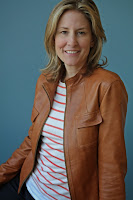Published: August 7, 2013 by Knopf
Have you ever felt like a book was published just for you? That's how I feel about this one. I'm going to try to do this novel justice, but I think anything I write will fall short of conveying just how this story spoke to me.
In Paris was the Place, we meet Willie who is living in Paris in her early 30s trying to figure out her place in life. She's trying to research a book she wants to write on an Indian poet, and is currently teaching girls who want to receive asylum to stay in France. She's dealing with her mother's death almost 2 years prior and rediscovering her relationship with the rest of her family without her mother. She's ready to fall in love. Part of the book is spent with her trying to figure out what to do when what your interpretation of the right thing to do isn't the same as others.
This novel takes place in the late 1980s, and while I don't think it's far enough back to qualify as historical fiction, you can't help but be transported to the time period. It's crazy in a way to think how much as changed in 25 years, to the point it's like a different world. One without cell phones or the internet. Or where there's pay phones on the street. It also mentions some of the big events of the 80s like the rise of AIDS and the protests at Tenement Square.
But not only does it feel like you're living in the 80s, you seem to walk through the street of both Paris and India at various points. Nothing like a novel that not only makes it feel like you're traveling the world, but also through time.
I'm not normally a quote person, but there's one that I knew needed to be part of my review, and is how I want to close out my review.
"My mother is gone. I feel quieter about her death here. In California all I wanted to do was yell. I'm grieving for her here in a way I couldn't before."
5/5
SYNOPSIS
With her new novel, Paris Was the Place (Knopf, 2013), Susan Conley offers a beautiful meditation on how much it matters to belong: to a family, to a country, to any one place, and how this belonging can mean the difference in our survival. Novelist Richard Russo calls Paris Was the Place, “by turns achingly beautiful and brutally unjust, as vividly rendered as its characters, whose joys and struggles we embrace as our own.”
When Willie Pears begins teaching at a center for immigrant girls in Paris all hoping for French asylum, the lines between teaching and mothering quickly begin to blur. Willie has fled to Paris to create a new family, and she soon falls for Macon, a passionate French lawyer. Gita, a young girl at the detention center, becomes determined to escape her circumstances, no matter the cost. And just as Willie is faced with a decision that could have dire consequences for Macon and the future of the center, her brother is taken with a serious, as-yet-unnamed illness. The writer Ayelet Waldman calls Paris Was the Place “a gorgeous love story and a wise, intimate journal of dislocation that examines how far we’ll go for the people we love most.” Named on the Indie Next List for August 2013 and on the Slate Summer Reading List, this is a story that reaffirms the ties that bind us to one another.
Author bio
Susan Conley is a writer and teacher. Her memoir, The Foremost Good Fortune (Knopf 2011) (My review is here.), chronicles her family’s experiences in modern China as well as her journey through breast cancer. The Oprah Magazine listed it as a Top Ten Pick, Slate Magazine chose it as "Book of the Week," and The Washington Post called it "a beautiful book about China and cancer and how to be an authentic, courageous human being." Excerpts from the memoir have been published in The New York Times Magazine and The Daily Beast.
Susan’s writing has also appeared in The Paris Review, The Harvard Review, The Massachusetts Review, The Gettysburg Review, The North American Review, Ploughshares, and elsewhere. A native of Maine, she earned her B.A. from Middlebury College and her M.F.A. in creative writing from San Diego State University. After teaching poetry and literature at Emerson College in Boston, Susan returned to Portland, where she cofounded and served as executive director of The Telling Room, a nonprofit creative writing center. She currently teaches at The Telling Room and at the University of Southern Maine’s Stonecoast MFA Program.












thanks so much for your great review! Emma [France Book Tours]
ReplyDeleteWow, awesome review. I love that quote that you shared at the end, but I also wish at the same time it was one you could not relate to. :( This is definitely a book I need to check out!!
ReplyDeleteI think I'll really like this one. Great quote.
ReplyDelete